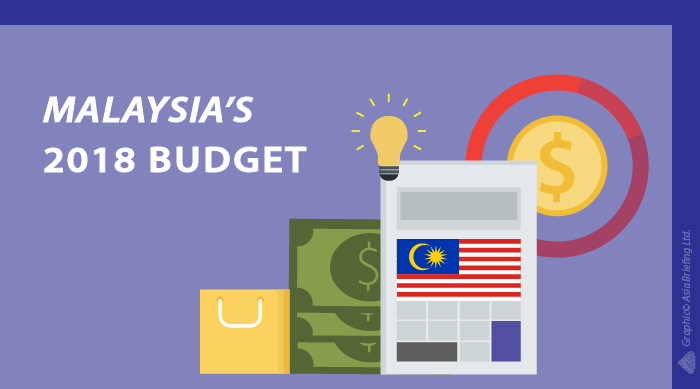Malaysia’s 2018 Budget: Salient Features
By Dezan Shira & Associates
Editor: Vasundhara Rastogi
On October 27, 2017, Malaysia’s Prime Minister Najib Abdul Razak tabled the country’s much anticipated 2018 budget. The new budget is in line with the government’s agenda to achieve Transformasi Nasional 2050 (TN50) or National Transformation 2050; TN50 is a 30 year-plan,first introduced in the budget 2017,that aims to make Malaysia one of the world’s top 20 countries by 2050.
Termed as a generous and people friendly budget, the proposed allocation for 2018 stands at RM280.25 billion (US$66.3 billion) – a rise of 7.5 percent from 2017. The Malaysian government has proposed several tax incentives for investors and venture capital firms in the 2018 budget. In this article, we look at the salient features of the budget and their implications for businesses.
 RELATED: Corporate Establishment Services from Dezan Shira & Associates
RELATED: Corporate Establishment Services from Dezan Shira & Associates
Corporate tax and tax incentives
Capital allowance for ICT equipment and software
The budget pays attention to the upgrade of information and communication technology (ICT) equipment and communications systems, which is crucial for a strong digital infrastructure for businesses. Currently, expenditure incurred on the purchase of ICT equipment and software packages is eligible for the accelerated capital allowance (ACA), which effectively allows a full capital allowance claim in the year of acquisition. The budget 2018 proposes capital allowance claim at the rate of 20 percent initial allowance and 20 percent annual allowance on the following expenditure:
- Expenditure incurred on the purchase of ICT equipment and computer software packages, with effect from the assessment year (AY) 2017; and
- Development of customized software comprising of consultation fees, licensing fees and incidental fees related to software development. This proposal is effective from AY 2018.
Tax incentives for Malaysia’s capital market
To promote Malaysia’s capital market and make it internationally more competitive, the budget proposes a three-year exemption on stamp duty for exchange-traded funds (ETFs) and structured warrants (SW). It will be applicable on ETF and SW executed from January 1, 2018, to December 31, 2020.
Besides, the budget offers tax relief for venture capital companies equivalent to the amount of initial investment; tax deductions for angel investors in venture capital projects; income tax deductions for environmentally and socially responsible Islamic bond issuers; and income tax exemptions for fund managers of conventional socially responsible funds.
Implementation of Earning Stripping Rules
The budget proposes replacement of the thin capitalization rules by the Earning Stripping Rules (ESR), a new method introduced by the Organization for Economic Cooperation and Development (OECD). Under the ESR, the interest deduction on loans between related companies within the same group will be limited to a ratio to be determined by the Malaysian Inland Revenue Board (MIRB), ranging between 10 percent and 30 percent of the company’s profit before tax. The ESR rules will be effective from January 1, 2019.
Other tax incentives
The Principle Hub Incentive: To increase Malaysia’s competitiveness as a global operations center for multinational companies, the budget has extended the application period for principal hub tax incentive to December 31, 2020. The principal hub incentive was initially launched in 2015 to provide income tax exemptions for companies which set up global operation centers in Malaysia. Currently, this incentive is available for applications made to the Malaysian Investment Development Authority (MIDA) by April 30, 2018.
Extension of incentives for new four- and five-star hotels: To expand tourism, the budget has extended the tax incentive for investment in four- and five-star hotels for a further two years, while the tax incentive for tour operators has been extended to 2020. For medical tourism too, the investment tax allowance has been extended.
Personal income tax
To increase the disposable income of the middle-income group and to address the rising cost of living in Malaysia the budget proposes to cut individual income tax rates by two percentage points for those earning between RM 20,000 (US$4,730) to RM 70,000 (US$16,552) a year.
The five percent rate on income up to RM 35,000 (US$8,276) will be reduced to three percent; the 10 percent rate on income up to RM50,000 (US$11,823) will be lowered to eight percent, and the 16 percent rate on income up to RM70,000 will be cut to 14 percent.
Goods and services tax relief
In an attempt to lower the cost of business, the budget proposes an exemption from the goods and services tax (GST) on services provided by the local authorities beginning next year. The exemption will come into effect from April 1 or October 1, next year, as opted by the respective local governments. Local authorities will not, however, be exempted from GST on the acquisition of commercial buildings or land, petroleum, and on the importation of motor cars.
In addition to that, all reading materials, including magazines, comics, journals and periodical publications will be zero-rated from January 1, 2018. Further, there will be a total exemption from GST for handling services provided by operators at all ports in the country for the period between January 1, 2018, and December 31, 2020.
The GST appeal tribunal and customs appeal tribunal will be merged into a single customs appeal tribunal, to enable taxpayers to submit their appeals on both customs and GST matters from January 1, 2019.
Support for businesses
Fourth industrial revolution
For business communities, the budget focuses on building capacity and capability to ensure Malaysian corporates are well placed to ride the fourth industrial revolution.
In view of rapid technology development, the Malaysian government has taken several measures to help companies transform into industry 4 (the fourth industrial revolution) with an emphasis upon digital application, big data analytics, robotics and automation applications.
The government in its budget proposes that the ACA and an automation equipment allowance be provided on the first RM10 million (US$2.4 million) qualifying capital expenditure incurred in AY 2018 to AY 2020. This incentive would apply to applications received by the Malaysian Investment Development Authority (MIDA) from January 1, 2018, to December 31, 2020.
 RELATED: Malaysian Labor Contracts: What You Need to Know
RELATED: Malaysian Labor Contracts: What You Need to Know
An increase in loans for small businesses
Realizing the significant contribution of the small and medium-sized enterprises (SMEs) in the nation’s growth and labor market, the Government has allocated RM200 million (US$47.3 million) for training programs, grants and soft loans for SMEs.
The budget proposes an allocation of about RM0.5 billion (US$118.2 million) into Tekun, a financial services agency that provides financing facilities for small enterprises, and RM200 million (US$47.3 million) into Amanah Ikhtiar Malaysia (AIM). The fund has benefited over 400,000 borrowers, of which the budget states to be majority women and good paymasters.
Other initiatives
Among other initiatives include a grant of RM245 million (US$58 million) under the domestic investment strategic fund, to upgrade smart manufacturing facilities. The Digital Free Trade Zone (DFTZ), first announced in Budget 2017, featured once again in Budget 2018. The initial phase of the DFTZ will enable 1,500 SMEs to participate in the economy, attract RM700 million (US$165.5 million) worth of investment and create 2,500 job opportunities. Additionally, the budget reduces the required minimum level of venture capital investment in a start-up business from 70 percent to 50 percent for the period 2018-2022.
|
 Dezan Shira & Associates Brochure
Dezan Shira & Associates Brochure
Dezan Shira & Associates is a pan-Asia, multi-disciplinary professional services firm, providing legal, tax and operational advisory to international corporate investors. Operational throughout China, ASEAN and India, our mission is to guide foreign companies through Asia’s complex regulatory environment and assist them with all aspects of establishing, maintaining and growing their business operations in the region. This brochure provides an overview of the services and expertise Dezan Shira & Associates can provide.
 An Introduction to Doing Business in ASEAN 2017
An Introduction to Doing Business in ASEAN 2017
An Introduction to Doing Business in ASEAN 2017 introduces the fundamentals of investing in the 10-nation ASEAN bloc, concentrating on economics, trade, corporate establishment, and taxation. We also include the latest development news for each country, with the intent to provide an executive assessment of the varying component parts of ASEAN, assessing each member state and providing the most up-to-date economic and demographic data on each.
 How to Set Up in the Philippines
How to Set Up in the Philippines
In this issue of ASEAN Briefing magazine, we provide an introduction to the Philippines as well as analyze the various market entry options available for investors interested in expanding to the island nation. We also discuss the step-by-step process for setting up a business entity in the Philippines, highlighting the various statutory requirements for overseas investors. Finally, we explore the potential for Singapore to serve as a viable base to administer investors’ Philippine operations.










